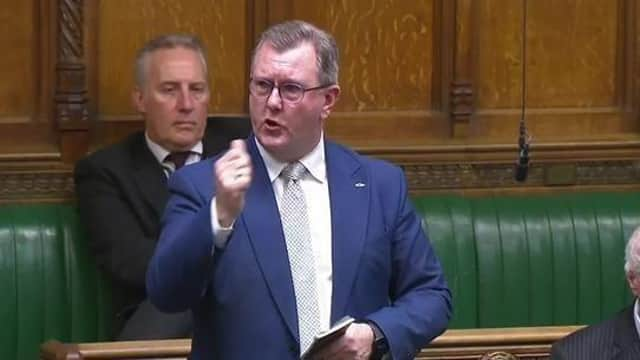Owen Polley: There is a lot of blame to allocate for the Irish Sea border but the DUP must accept its share


These hints were strengthened by news that the party’s 130-member executive is due to meet this evening for an ‘update on the current political situation’.
In the House of Commons, Sir Jeffrey gave an impassioned speech that attracted a lot of attention and sympathy. He claimed that he had been threatened, “because of the stirring up that’s going on”.
Advertisement
Hide AdAdvertisement
Hide AdIt is deplorable that some people here try to intimidate and threaten elected politicians. That kind of intervention is utterly unacceptable and it only damages the cause that they claim to support.
Sir Jeffrey’s remarks, though, ranged far beyond that topic. Notably, he attacked his unionist political opponents in the TUV and claimed that the DUP had succeeded in improving the Northern Ireland Protocol, through its boycott and subsequent negotiations with the government. That argument is more rickety.
Where the Irish Sea border is concerned, there is a lot of blame to allocate, but the DUP must accept its share.
If we take things back almost to the beginning, after insisting on an ineffectual last minute change, in December 2017 the party accepted a deal brokered by Theresa May, that tied Northern Ireland to European law in order to avoid a land border. That was effectively the ‘original sin’ that led us to where we are today and established the ‘backstop’ that would eventually evolve into the protocol.
Advertisement
Hide AdAdvertisement
Hide AdAt the end of 2019, the DUP also conceded the principle that there could be a regulatory border in the Irish Sea, as Boris Johnson edged toward striking his own Brexit deal.
Eventually, that most slippery of prime ministers added customs barriers to his arrangement, and the DUP opposed the Withdrawal Bill. But the party had, in theory, endorsed the idea that some barriers would separate our economy from the rest of the UK.
Unfortunately, key DUP figures did not seem to understand then how critical the issue of regulation and law was to our place in the UK. Indeed, months after the protocol was agreed, in February 2020, Sir Jeffrey was still telling the BBC that the deal could present an ‘opportunity’ for businesses in Northern Ireland. He went so far as to dismiss the idea that a customs border had implications for our constitutional position.
Back in the present, in the House of Commons, Sir Jeffrey implied that the Windsor Framework represented ‘progress’ over the original protocol, which is something that he’s said before. That contention rests largely on the fact that the protocol was never implemented fully.
Advertisement
Hide AdAdvertisement
Hide AdIn fact, the framework entrenched rather than removed the Irish Sea border. It brought to an end grace periods that had, to that point, blunted the protocol’s effects.
Indeed, a seminal House of Lords’ report, to which Sir Jeffrey’s colleague Lord Dodds contributed, acknowledged that, in many respects, the Windsor deal was worse than the protocol, as it had thus far been implemented.
That report, to be fair, also repeated unconvincing claims of ‘progress’ from some business representatives. But these were based on vague ideas that the UK was now on better terms with the EU and that would eventually bring benefits, whereas the problems and confusion created by the framework were explained in more concrete terms.
With all this in mind, unless the DUP’s negotiations with the government have achieved a great deal more than the leaks suggest, then it is hard to see what the party has actually delivered.
Advertisement
Hide AdAdvertisement
Hide AdAn important caveat is that the details of the government’s offer have not yet been published officially. During his Commons speech, Sir Jeffrey urged us to wait to see what the final proposed deal contained.
Nevertheless, the Daily Telegraph continued to publish leaked reports of the proposed agreement last week. One headline suggested that Rishi Sunak had, “offered to sacrifice Brexit freedoms to re-establish government in Northern Ireland,” but the story was less sensational.
It claimed that the prime minister was prepared to screen every new law, to ensure that it did not create additional barriers for internal UK trade. That, at least, seemed like an attempt to address an issue created by the protocol. However, while the divergence of laws between the UK and EU is a real problem for Northern Ireland, most of that process is driven by new rules in Brussels.
In other words, while the prime minister’s offer could, in principle, restrain our government from making the sea border worse, it will not stop our economy from drifting ever further from the rest of the UK, never mind repair damage that has already been done.
Advertisement
Hide AdAdvertisement
Hide AdAnyway, as David Thompson reported in the News Letter on Friday, senior Tories, including business secretary, Kemi Badenoch, were quick to reject the plan.
On Friday, the Telegraph also leaked a claim that unionists would be able to trigger an independent report into the Windsor Framework, by voting against it at Stormont. Like the suggestion that the green lane could be renamed the ‘UK Internal Market Lane’, to use an old saying, that would be funny if it weren’t so serious.
It is always possible that the Telegraph’s briefings are underselling the significance of the government’s offer. If its claim is accurate, though, that ministers did not even try to alter the structures of the framework, that is hardly an encouraging sign.
There is still a risk that the DUP will claim to have solved problems with the UK internal market through this negotiation, when unionism will, in reality, have to wrestle with them for many years to come.